Search
Remove Ads
Advertisement
Summary 
Loading AI-generated summary based on World History Encyclopedia articles ...
Search Results
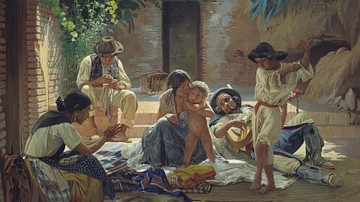
Definition
Romani
Romani is an umbrella term used to describe a diverse ethnolinguistic group of people with a historical presence in Europe and West Asia. The historically common term 'Gypsy' is based on the myth that they came from Egypt. In reality, the...
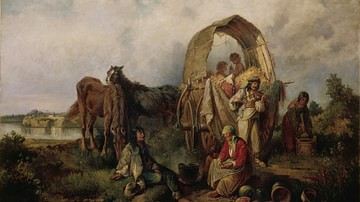
Definition
Romani Language
Romani is an Indo-European language, belonging to the Indic subbranch which includes Sanskrit and Hindi. Because of the Romani diaspora throughout Europe and West Asia, it developed in close contact with European and Iranian languages. It...
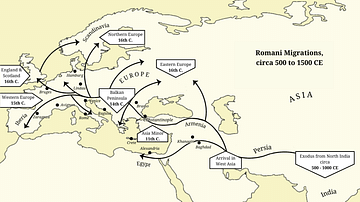
Image
Map of Romani Migration in the Middle Ages
Map showing the movement of the Romani people between approximately 500 and 1500 CE. The dates used on this map are commonly accepted approximations based on historical accounts and linguistic evidence. Some dates, such as the timeframe in...

Video
Forgotten History: the Romani (Gypsy) Migration from India to Europe
The Romani (colloquially known as the "Gypsies") are a community of European itinerants with surprising origins in northwest India. In this video, we explore the fascinating histories of two distinct Romani groups: the Roma and the Sinti...

Definition
Josef Mengele
Josef Mengele (1911-1979) was a Nazi doctor who performed horrific pseudo-scientific experiments on detainees in the Auschwitz concentration camp where he was a medical officer from 1943 to 1945. Thousands of Mengele's victims endured bizarre...

Definition
Auschwitz
Auschwitz was a concentration and extermination camp in German-occupied Poland operated by the Nazi SS from 1940 to 1945. Around 1.1 million people died at the Auschwitz complex from overwork, malnutrition, disease, and in the gas chambers...

Image
Gypsy Family
Gypsy Family, oil on canvas by Mihály Munkácsy, 1884.
Private collection.

Definition
Einsatzgruppen
Einsatzgruppen ('deployment groups') were secret Nazi killing units, who systematically sought out and murdered civilians identified as enemies of the Third Reich. Operating without any legal restrictions in territories newly conquered by...
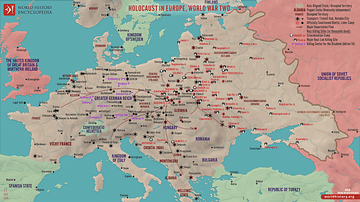
Image
Holocaust in Europe during World War Two
This map illustrates the scale and scope of the Holocaust in Europe during World War II, a systematic, state-organized persecution and murder of approximately six million Jews, alongside millions of other victims, by Nazi Germany and its...
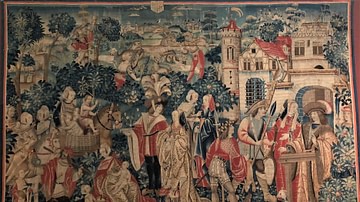
Image
The Visit of the Gypsies
The Visit of the Gypsies, a Franco-Flemish tapestry depicting a group of European nobles hunting, while a procession of gypsies (Romani) arrive from the left of the scene, made c. 1510. Wool and silk, 350.52 cm (138 in) x 487.68 cm (192 in...